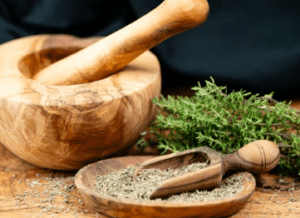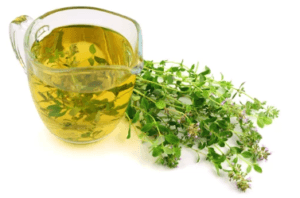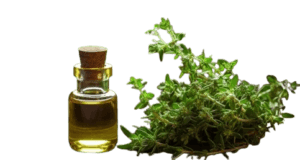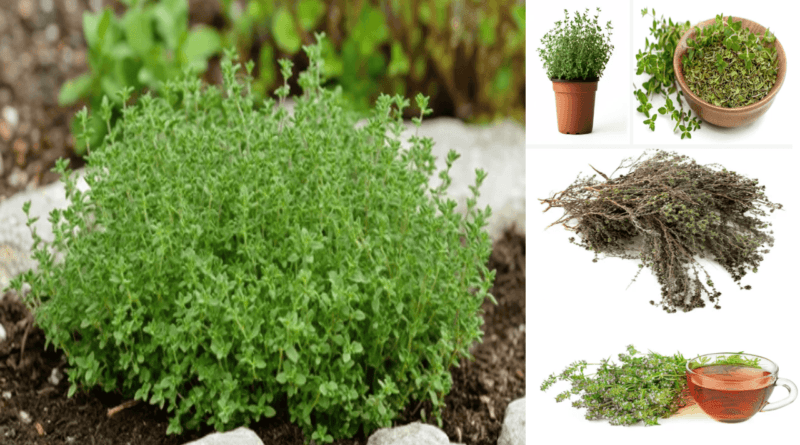Thymus vulgaris
Thymus vulgaris, commonly known as thyme, is a remarkable perennial herb celebrated for its culinary, medicinal, and aromatic properties. With its delightful fragrance and numerous health benefits, thyme has earned a permanent spot in kitchens and gardens worldwide. In this article, we’ll uncover why this small yet powerful herb deserves a place in your home.
What is Thymus vulgaris?
Belonging to the Lamiaceae family, also known as the mint family, Thymus vulgaris thrives in well-drained, sandy soil and basks under abundant sunlight. Originating from the Mediterranean region, this hardy shrub grows up to 12-15 inches tall. Its tiny, oval-shaped leaves exude a strong, earthy aroma, while its delicate pink or purple flowers attract bees, butterflies, and other pollinators.
Thyme’s drought-resistant nature makes it perfect for low-maintenance gardens, rock landscapes, and container gardening.
Culinary Uses of Thymus vulgaris


Thyme is a culinary gem, adding depth and flavor to a variety of dishes. Whether fresh or dried, it delivers a sharp, savory note. Common culinary uses include:
- Soups and stews
- Marinades and sauces
- Roasted meats and vegetables
- Salads and homemade bread
- Infused oils and beverages
Its earthy flavor, with subtle lemony undertones, makes it a staple in Mediterranean and Italian cuisines. Next time you’re cooking, sprinkle some thyme into your dish for a burst of flavor.
Health Benefits of Thymus vulgaris
Beyond its culinary value, thyme is renowned for its medicinal properties. Here are some notable health benefits:

1. Rich in Antioxidants
Thyme contains thymol and carvacrol, natural antioxidants that combat harmful free radicals. These compounds help reduce oxidative stress and may lower the risk of chronic diseases such as heart disease and cancer (Healthline).
2. Supports Respiratory Health
For centuries, thyme has been used to treat respiratory ailments. Its antimicrobial and anti-inflammatory properties soothe coughs, bronchitis, and asthma. Drinking thyme tea or inhaling thyme essential oil can alleviate breathing difficulties (NCBI).
3. Boosts Immunity
Loaded with vitamin C, thyme supports a robust immune system. Regular consumption helps ward off infections, while its antibacterial properties further strengthen the body’s defenses (Herb Society of America).
4. Promotes Digestive Health
Thyme aids digestion by stimulating gastric juice production, reducing bloating, and preventing indigestion. Adding thyme to meals can enhance overall digestive health.
Growing Thymus vulgaris in Your Garden
Growing thyme is simple and rewarding. Here’s how to ensure it thrives:

1. Choose the Right Location
Thyme flourishes in sunny spots with well-drained soil. Aim for at least 6-8 hours of sunlight daily. It’s an excellent choice for rock gardens, raised beds, or xeriscaping.
2. Watering and Soil Care
While thyme is drought-tolerant, occasional watering is necessary during dry spells. Avoid overwatering to prevent root rot.
3. Harvesting Thyme
Harvest thyme 2-3 months after planting. Use garden shears to snip stems, leaving a few inches above the base to encourage regrowth. Fresh thyme can be used immediately, or dried for future use.
How to Use Thymus vulgaris in Your Daily Life
Thyme’s versatility extends beyond the kitchen. Here are some creative ways to incorporate it into your daily routine:
1. Make Thyme Tea

Steep fresh or dried thyme leaves in hot water for 5-10 minutes. Add honey or lemon for extra flavor. This tea is both soothing and health-boosting.
2. Use Thyme Essential Oil

Diffuse thyme essential oil to purify the air, add it to warm baths for relaxation, or dilute and apply it topically to soothe skin irritations.
3. Create Herbal Remedies
Combine thyme with herbs like rosemary and oregano to craft tinctures, syrups, or salves for respiratory and digestive health.
Thymus vulgaris, or thyme, is far more than just a kitchen herb. Its health benefits, aromatic charm, and ease of cultivation make it an invaluable addition to any home. Whether you’re a gardening enthusiast or a culinary adventurer, thyme offers endless possibilities.
Start incorporating thyme into your meals, teas, and natural remedies, and experience firsthand why this herb has been cherished for centuries.
References
- Healthline. “Thyme: Benefits, Uses, and Side Effects.” Healthline.
- NCBI. “Thyme (Thymus vulgaris) in Traditional Medicine.” NCBI.
- The Herb Society of America. “Thyme: A Super Herb for Your Garden and Kitchen.” Herb Society.




